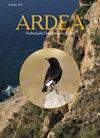Habitat Specialisation Affects Fitness of the Marine and Continental Great Cormorant Subspecies in a Recently Evolved Sympatric Area
IF 1.3
4区 生物学
Q3 ORNITHOLOGY
引用次数: 0
Abstract
With the aim of studying ecological specialisation between subspecies, we compared the components of breeding success in individuals of two recently sympatric subspecies, carbo (‘marine’) and sinensis (‘continental’), of the Great Cormorant in a continental colony. The subspecific origin of broods was determined using D-Loop mtDNA and microsatellites. Although there were no differences in clutch size and laying date between the subspecies, mean fledging success was lower for the marine subspecies (–30% according to mtDNA assignment, –38% according to microsatellite assignment) than for the continental subspecies, while mixed breeding pairs had an intermediate fledging success. These results showed that the marine subspecies is less well adapted than the continental one to inland water, which is considered to be the optimal habitat of the continental subspecies. According to these results and to the geographical expansion of the continental subspecies, we suggest that the proportion of marine subspecies in western European inland colonies could decrease when density-dependent competition increases due to saturation.栖息地的专一化影响了最近进化的同域区海洋和大陆大鸬鹚亚种的适应性
为了研究亚种之间的生态特化,我们比较了最近在大陆殖民地的两个同域亚种,即大Cormorant的carbo(“marine”)和sinensis(“continental”)的个体繁殖成功的组成部分。使用D-Loop mtDNA和微卫星确定了窝的亚种起源。尽管亚种之间的窝大小和产卵日期没有差异,但海洋亚种的平均出芽成功率(根据mtDNA分配为-30%,根据微卫星分配为-38%)低于大陆亚种,而混合繁殖对的出芽成功度中等。这些结果表明,海洋亚种比大陆亚种更不适应内陆水域,内陆水域被认为是大陆亚种的最佳栖息地。根据这些结果和大陆亚种的地理扩张,我们认为当密度依赖性竞争因饱和而增加时,西欧内陆殖民地海洋亚种的比例可能会降低。
本文章由计算机程序翻译,如有差异,请以英文原文为准。
求助全文
约1分钟内获得全文
求助全文
来源期刊

Ardea
生物-鸟类学
CiteScore
2.10
自引率
0.00%
发文量
49
审稿时长
>12 weeks
期刊介绍:
Ardea is the scientific journal of the Netherlands Ornithologists'' Union, and is published since 1912. The journal welcomes manuscripts reporting significant new findings in ornithology, in particular those covering the ecology, life history, and evolution of birds, and including sound descriptive work. Ardea publishes Original research papers, Short notes and Book reviews. In addition to the regular three issues per year, Ardea publishes specials that contain conference or workshop proceedings (produced on request).
 求助内容:
求助内容: 应助结果提醒方式:
应助结果提醒方式:


